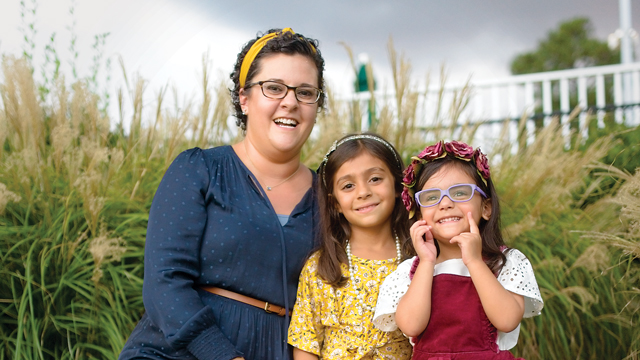When cancer hits, it feels like a tsunami that comes crashing into you. Just like a huge wave, the devastation reaches far and wide. The fear, anxiety, burden of care, and concern extends through your whole village. And when you’re the mom of a 6-year-old and 2-year-old, unfortunately, it affects them, too.
I learned this the hard way over the past year after I discovered a lump in my left breast one otherwise uneventful Saturday in July of 2018.
Oh, to go back to those good old days when my biggest annoyance was having a mammogram three years before it would have been regularly scheduled. But I am thankful that I had the presence of mind to get it checked out. Better to just get it over with, I thought.
The diagnostic mammogram was followed by an ultrasound, pretty standard practice. When the tech got very quiet and kept taking pictures and told me the doctor would be in to do the whole thing again, I started to get nervous. The doctor did his part, then casually announced, “Well, we don’t know for sure, but it is cancer.”
Cue the sobbing. What? How could this be happening? I’m thirty-seven with no family history of breast cancer. I eat organic food. I had just jogged the Monument Avenue 10k! At that moment, my world stopped.
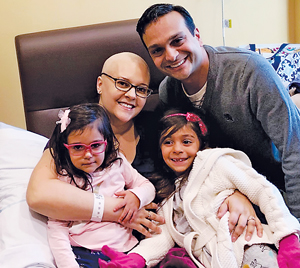
My Kids Don’t Deserve This
My first thought was that this was a death sentence. My young kids will be left without a mother. They don’t deserve this.
My dad was unwell for most of my young adulthood, basically from the time I graduated college until he passed away four years ago. I watched my much younger sisters grapple with situations and feelings that were too weighty for anyone their age. I did not want my kids to experience even a fraction of this.
After a biopsy, we officially found out my tumor was positive for invasive ductal carcinoma. I remember feeling numb – except for the waves of heat running up and down my body – as the doctor said the words: invasive ductal carcinoma.
It would be two more weeks before I found out the scope of what I was dealing with. All I knew at that time was that I had cancer in my breast and lymph nodes, and according to the radiologist, it was “angry.”
I left that appointment scared, sad, and confused. I decided to wait to tell my kids until we had more information about my diagnosis and prognosis. I didn’t even understand what the doctor meant by describing my cancer as angry, so I was sure it would confuse my kids.
You can imagine that the next two weeks were excruciating. My husband, mom, and sisters knew, along with my boss and close co-workers, but that was about it. We tried to keep the kids’ routines close to normal as I went through test after test and amassed a team of doctors – at Cleveland Clinic, where I have family members who work in oncology, and at VCU Massey Cancer Center.
Finally, we found out that the cancer was contained to my breast and lymph nodes – a huge relief. It was classified as stage 3 triple negative breast cancer. Triple negative means that the three most common receptors that fuel cancer growth were not found in the tumor. This is considered an aggressive, but treatable type of breast cancer. My doctors advised I do chemotherapy first, followed by surgery, and then radiation. The prognosis? It would be a rough nine months, but I was expected to get through it.
At one point, my hematology oncologist at Cleveland Clinic, who is also the director of the breast oncology program at the top-rated cancer hospital, looked me in the eyes and said, “You will be okay.” It was a small gesture and a simple statement, but it has stuck with me to this day. I took him at his word and believed I would get better, despite how scared I was of the unknown – not only for myself, but for my kids.
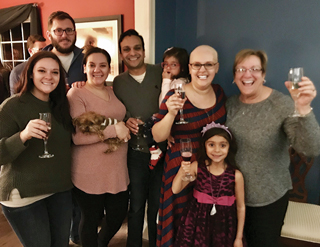
Breaking the News
I knew the next step was to tell my kids. My very perceptive older daughter was likely going to hear us talking about it soon – if she hadn’t already – and I didn’t want her to be scared. I was also scheduled to start chemotherapy and was told that my hair would absolutely fall out, even if I tried to use a cold cap (scalp-cooling headgear that helps reduce hair loss during chemo).
Amy Holleman, a Richmond therapist who specializes in children’s issues, says it’s natural to want to protect your children from the details about an illness. But she says it’s in the kids’ best interests to give them developmentally appropriate details. “Research continues to show that having no information can considerably increase a child’s anxiety and instill more fear in him or her,” says Holleman.
When I was a child, my grandfather went through treatment for prostate cancer. The adults in our family decided not to talk about it with the kids. But that didn’t stop me from realizing something was wrong. It was scary not knowing what was happening and not feeling empowered to ask questions. I didn’t want my daughters to feel that way.
At the time, we were staying with family in Ohio for all of my screenings and tests. Information was flying at me a mile a minute, and I didn’t make the time to do much research on communicating about the disease with kids. I relied on the bits of advice I picked up when my father passed away: Use real words, and be direct without being scary. Kids don’t understand overly colorful language or euphemisms.
My husband and I sat down with our two girls and told them I had breast cancer. I let my daughter feel the lump. I told her the doctors were going to give me very strong medicine to make it go away, but that medicine was going to make me lose my hair. Boiling it down to those very simple facts was helpful to me, too. It took a lot of the emotion and the unknown out of it.
Later that morning, my mom came downstairs for breakfast. She didn’t know we had told the kids until my daughter said, “Mommy is going to get medicine for her boob that’s going to make her go bald!” Talk about being direct with real words. Message received.
Chemo started within a week, and the facility where I had my first treatment brought in an art therapist and invited my older daughter to craft with me during the treatment. It was a treasured moment before the storm really came in.
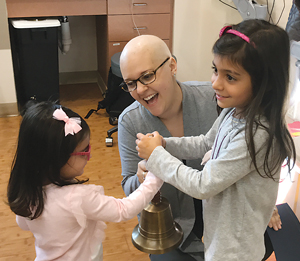
It Took a Village to Weather This Storm
Aside from eradicating my cancer, my biggest goal was to keep my kids’ routines as normal as possible while I was going through treatments. I didn’t want them to feel like they were missing out because of my cancer.
Holleman said that’s a solid parenting strategy. “Fostering predictability and stability in this sense helps the child feel more in control during such an uncertain time.”
Thankfully, my mom graciously offered to move in with us for the majority of the time I was going through chemotherapy. She was willing and able to step in to do bus pick-ups, sit through cheerleading practice, do household chores, and occupy the kids while I rested after work, trying to recover as much as possible in between treatments. My husband picked up extra duties around the house while working his full-time job and managing the insurance and information side of things. Just keeping all of the appointments and doctors’ information in order is a hefty load, especially since I was receiving care from VCU here in Richmond and in Cleveland.
When I say my village showed up, they really showed up. My friends put together a meal train and would check in on me often. It wasn’t unusual for me to come home to a card or a little pick-me-up on my doorstep. I could see that this was hard on my circle of friends and family, too. In the beginning, it was hard to accept help; I had always been the helper. But the more I said yes, the more I realized I needed support, and in a lot of cases, my friends and family needed to help me. A group of close friends even donated money in my name to fund cancer research when I kept declining their help. They refused to not help.
I kept my part-time job and worked as much as I could. It was important for me to have a normal life to go back to. I wore a wig, and few people knew what I was going through until at least half way through my treatments. Eventually, my fear of people treating me differently once they found out I was a cancer patient was trumped by my desire to share my story to encourage others to advocate for their health. So, I took off my wig and revealed my shiny bald head. People were shocked. I heard, “I had no idea” more times than I could count. That was quickly followed by, “How can I help?” My village expanded, and I felt even more nurtured.
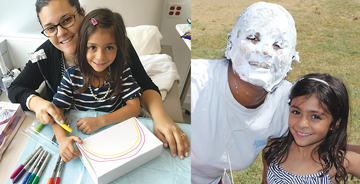
Keeping Tabs on the Kids’ Feelings
Even with the huge amount of help, chemotherapy was grueling, especially the first four of the eight treatments. The best way to describe it is to say it was like getting hit with a harder version of the worst flu I’ve ever had – every two weeks.
Keeping tabs on my daughters’ emotions was tough. I was around them less because I was so sick and I could tell they were putting on brave faces for my benefit. It was hard relying on my husband and mother for that kind of information. They didn’t want to upset me either. On the surface, the kids seemed fine. It wasn’t until after my treatments, with my surgery date approaching, that I began picking up on signs that my older daughter might be concerned. Surgery is a scary word, especially for a little one.
Holleman says when kids go through any stressful situation, anxiety and distress can manifest in many different ways, including behaviorally or physically.
“Parents need to be cognizant that children may begin to report headaches and stomachaches more often during a time of change in the child’s life,” she says. “In addition, a child’s behavior can change considerably. Often the behavior is either regressive in nature or uncharacteristic for their child.” She says some of the behavioral cues could be mood shifts, aggression, lying, thumb sucking, or bedwetting among many others.
Once my chemotherapy ended the day before Thanksgiving, I started to recover and was able to enjoy the holiday season until my surgery in mid-December. Since I was feeling a little better, I noticed some behaviors in my firstborn that were concerning. And sure enough, as soon as I was home from the hospital, they stopped.
Everything went as expected with the surgery, and the pathology report showed I had a complete response to the chemotherapy – meaning it was all gone by the time I got to surgery. Because of the initial progression of my cancer, radiation was still recommended. I tried to do as much of that during the school day as possible to minimally impact the kids. Radiation wore me out, but I wasn’t as sick physically. I officially finished my active treatment in mid-March.
While I am currently cancer-free, I still need at least one more surgery, and there are lingering issues related to my treatments. As far as my kids are concerned, the cancer is gone. I stopped wearing my wig after my surgery, and my hair is slowly growing back.
Cancer is a Part of Our Lives Now
I’m out of active treatment, but still seeing more doctors than normal and pursuing my desire to support others through advocacy and volunteering to help families who aren’t as privileged as mine. And we still talk about cancer pretty often in our family. I’ve noticed my older daughter bristling when the topic comes up. Holleman says this is probably because she wants to put my cancer and the negative emotions associated with it behind her. She suggested reframing what cancer means and putting a positive spin on it.
While that sounds like a tall order, we started by sending our older daughter to Camp Kesem at UVA. This camp for kids whose parents or caretakers have been through cancer is run by college chapters across the country. The week is filled with everything a summer camp should have: lots of fun and memory-making, but also time every night to talk about how cancer has affected their young lives, if they choose to share. But more than that, it shows those kids that they’re not alone. A few months ago, my daughter came home from camp with the biggest smile on her face that I’ve seen since I told her about the cancer.
We also like to incorporate books into our routine to help with many issues, including this cancer journey. Holleman says books provide education and help normalize a child’s thoughts and feelings. Here are a few she recommends: A Visit to Sesame Street Hospital, Why Does Mommy Hurt?, Daddy’s Disease, In Mommy’s Garden, Mom Has Cancer, Nowhere Hair, and The Hugging Tree.
I also recommend Someone I Love is Sick by Kathleen McCue. This book is like a 3-ring binder that lets you customize the story based on your circumstances and your child’s age before you read it.
Holleman stresses using developmentally appropriate words and books with your kids when you talk about your illness. And that’s where a child therapist can come in. “If you aren’t confident in your response, seek out a medical or mental health professional who can assist you with developmentally appropriate language and responses,” she says.
The Journey Continues
More than a year later, I feel like I finally have my head above water and my family is slowly finding its new normal. I find myself filled with gratitude for my family and friends and current health. I’ve learned how quickly that can change. Every day I’m healthy is a good day. Every milestone I see my girls mark is a small celebration. I hope this ordeal is but a memory for them very soon.
For me, I live with my cancer every day. There are not only changes to my body, but to my perspective on life. I hug my kids a little tighter and find a little more joy in the ordinary. These are changes I hope never go away.
Photo: Scott Schwartzkopf


